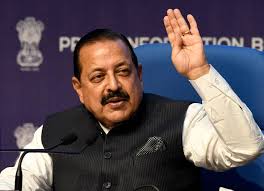NEW DELHI: Union Minister Dr Jitendra Singh on Thursday announced that India is set to conduct its first-ever biological experiments aboard the International Space Station (ISS) to study the sustainability of human life in space.
The initiative has been undertaken under the ‘BioE3 Biotechnology policy’ launched by Prime Minister Narendra Modi last year.
These unique experiments, spearheaded by ISRO in collaboration with the Department of Biotechnology (DBT), will be carried out as part of the upcoming International Space Station (ISS) mission AXIOM-4, with Indian astronaut Group Captain Shubhanshu Shukla as a crew member.
Singh said that the first experiment at the ISS will examine the impact of microgravity and space radiation on the growth of edible microalgae, a potential nutrient-rich food source for long-duration space missions.
The second experiment at the International Space Station will study the growth and proteomic responses of cyanobacteria, such as Spirulina and Synechococcus, under microgravity conditions using urea- and nitrate-based media.
Singh emphasised the need to recycle carbon and nitrogen from human waste during prolonged space travel to achieve self-sustainability in spacecraft and future extra-terrestrial colonies. Cyanobacteria, due to their fast growth and efficient photosynthesis, are ideal agents for such recycling systems.
The experiments have been developed in association with scientists from the International Centre for Genetic Engineering and Biotechnology (ICGEB), New Delhi, under the broader ISRO-DBT research collaboration.


